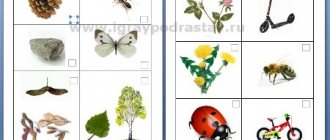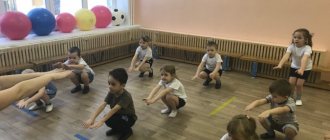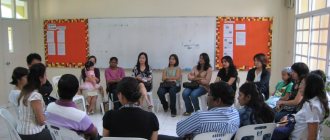Summary of a lesson on spiritual and moral education in the senior group on the topic: “Good - bad”
If it's a clear day, that's good.
And when it’s the other way around, it’s bad.
You can hear them ringing high in the sky
Strings of sunlight.
If you are kind, it’s always easy,
But when it’s the other way around, it’s difficult...
Educator:
What is this song about?
Children's answers:
About kindness.
Educator:
Listen to this good proverb: “Life is given for good deeds.” Let's think about what children should be like?
Children's answers:
Kind, obedient, modest, hardworking, clean, compliant, generous.
Educator:
What should children not be like?
Children's answers:
Angry, lazy, disobedient, greedy, deceitful, stubborn.
Didactic game “Choose good deeds”
1. The boy helps his grandmother thread the needle. What a good boy! After all, grandma is old, her eyes can’t see well and she can’t cope without outside help!
2. The girl picks flowers in the flowerbed and collects them into a bouquet. This is very bad! Flowers grow in a flowerbed to make everyone beautiful, flowerbeds decorate streets, alleys, parks, but plucked flowers will no longer please anyone with their beauty.
3. The boy reads a book to his little brother. This is amazing! After all, my brother is still very small and doesn’t know how to read himself.
4. The boy washes the dishes. A very good deed! Mom will come home tired from work, and the dishes will already be clean!
5. A girl waters the beds in the garden. Well done! She's probably helping her grandfather or grandmother.
6. The boy climbed into a puddle and stomped his feet. This is very bad, because he will get all dirty and his mother will have to wash him and wash everything, and he may also catch a cold and get sick!
7. The big girl pushed the little girl off the swing and she fell and hit herself. Isn’t it a shame to offend little ones?
8. A girl in the park pours seeds into a feeder. What a good girl! She understands that birds are cold and hungry in winter!
Educator:
Guys, listen carefully to the poem “How to behave during the day?”
Educator:
Let's list the good deeds of the day.
Children's answers:
Don’t brag, try to please your loved ones with good deeds, say “Thank you,” don’t whine, endure unpleasant things, boldly fight evil, ask for forgiveness if you offended someone.
Educator:
Guys, now prepare the colored circles that are on your tables. I will read excerpts from literary works familiar to you, and you will determine whether the heroes act well or badly. If you think it is good, then show a yellow circle, if it is bad, show a blue one.
“Kolobok, Kolobok, I’ll eat you!” ( blue
)
“Masha walked and walked through the forest - tree after tree, bush after bush, and got lost!” ( blue
)
“The animals built a mansion better than before and began to all live in it together” ( yellow
)
Card index of conversations with children 5–7 years old “Let’s talk about etiquette”
Nina Aleksandrovna Volkova
Card index of conversations with children 5–7 years old “Let’s talk about etiquette”
Development of free communication between children and adults and children. "Let's talk about etiquette."
Joint activities of the teacher with children 5-7 years old.
Etiquette is the rules of behavior of people in society, supporting the ideas of a given society about what is appropriate.
September
Conversation "Friends".
Tasks. Continue to develop children's speech as a means of communication. Encourage children to try to express their point of view. Develop children's ability to observe ethical communication. Maintain children's interest in folk proverbs. Foster friendly relationships between children.
Talk.
“Children, let’s sit side by side and talk well, as from ancient times in Rus' they invited people to talk.” To a conversation when a person shares his thoughts. Why do you think the popular proverb says: “Friends are easy to find, but difficult to keep?” (children's assumptions).
The teacher encourages the children.
- Don't be shy about your opinion! It is important for us to know what each of you thinks.
Kindly stops children who are trying to interrupt a friend's story.
- Please don’t interrupt, comrade. Respect your friend's opinion.
The teacher listens to the statements of all children. Summarizes what has been said.
“Children, in order to keep a friend, you must be faithful to your friend.”
Good advice: “Give thanks for good things.”
Tasks. Continue to enrich children's vocabulary with “polite” words. Foster a culture of behavior in children.
Advice.
- Children, I offer you good advice, I wish you well. You always say the word “thank you”, thank you for kindness.
Conversation: “Greed degrades, modesty adorns.”
Tasks. Continue to develop children's speech as a means of communication. Encourage children to try to express their point of view. Develop children's ability to observe ethical communication. Maintain children's interest in folk proverbs. Cultivate modesty in children.
Talk.
“Children, let’s sit next to each other and talk well.” Why do you think folk wisdom says: “Greed degrades, modesty adorns?” (children's assumptions).
The teacher encourages the children.
- Don't be shy about your opinion! It is important for us to know what each of you thinks.
Kindly stops children who are trying to interrupt a friend's story.
- Please don’t interrupt, comrade. Respect your friend's opinion.
The teacher listens to the statements of all children. Summarizes what has been said.
- Children, don’t show greed, don’t forget about modesty.
October
Conversation “Hurry to do good.”
Tasks. Continue to develop children's speech as a means of communication. Encourage children to try to express their point of view. Develop children's ability to observe ethical communication. To instill in children a desire to show concern for others.
Talk.
“Children, let’s sit next to each other and talk well.” Why do you think they say: “Hasten to do good?” (children's assumptions).
The teacher encourages the children.
- Don't be shy about your opinion! It is important for us to know what each of you thinks.
Kindly stops children who are trying to interrupt a friend's story.
- Please don’t interrupt, comrade. Respect your friend's opinion.
The teacher listens to the statements of all children. Summarizes what has been said.
- Children, good deeds will be returned with good. Live in peace, kindness, bring joy to people.
Good advice: “Don’t offend anyone.”
Tasks. Foster friendly relationships between children. Remind the rules of conduct in kindergarten.
Advice.
“Children, I offer you good advice and remind you of the rules of behavior.” Follow the rules of friendly children - do not offend anyone.
Conversation: “Bravery is not strength.”
Tasks. Continue to develop children's speech as a means of communication. Encourage children to try to express their point of view. Develop children's ability to observe ethical communication. Maintain children's interest in folk proverbs. Encourage children to take care of the younger ones, help them, protect those who are weaker.
Talk.
“Children, let’s sit next to each other and talk well.” Why do you think folk wisdom says: “Courage is not in strength, but in the heart?” (children's assumptions).
The teacher encourages the children.
- Don't be shy about your opinion! It is important for us to know what each of you thinks.
Kindly stops children who are trying to interrupt a friend's story.
- Please don’t interrupt, comrade. Respect your friend's opinion.
The teacher listens to the statements of all children. Summarizes what has been said.
- Children, a brave person is not the one who is stronger, but the one who is kinder. Protect your younger ones, never offend them. Children, live in peace, kindness, bring joy to people.
November
Problem situation “Should I give in to a friend?”
Tasks. Support children's desire to resolve controversial issues and resolve conflicts through speech: convince, prove, explain. Encourage children to try to express their point of view. Develop children's ability to observe ethical communication. Foster friendly relationships between children.
Talk.
- Children, please help, offer advice. Do you think you should give in to a friend in a game? (children's assumptions).
The teacher encourages the children.
- Don't be shy about your opinion! It is important for us to know what each of you thinks.
Kindly stops children who are trying to interrupt a friend's story.
- Please don’t interrupt, comrade. Respect your friend's opinion.
The teacher listens to the statements of all children. Summarizes what has been said.
— Children, a popular Russian proverb says: “It’s easier to lose a friend than to find one.” Children value your friendship, take care of your friends. Give in to each other, don’t start quarrels.
Good advice “Play fairly.”
Tasks. Foster friendly relationships between children. Remind the rules of conduct in kindergarten.
Advice.
“Children, I offer you good advice and remind you of the rules of behavior.” Follow the rules of friendly children - play fairly.
Conversation: “The smarter is the more modest.”
Tasks. Continue to develop children's speech as a means of communication. Encourage children to try to express their point of view. Develop children's ability to observe ethical communication. Maintain children's interest in folk sayings. Cultivate modesty in children.
Talk.
“Children, let’s sit next to each other and talk well.” Why do you think folk wisdom says: “The smarter is the more modest?” (children's assumptions).
The teacher encourages the children.
- Don't be shy about your opinion! It is important for us to know what each of you thinks.
Kindly stops children who are trying to interrupt a friend's story.
- Please don’t interrupt, comrade. Respect your friend's opinion.
The teacher listens to the statements of all children. Summarizes what has been said.
— An intelligent person always behaves modestly and does not brag about his knowledge. The smarter is the more modest.
December
Conversation about friendship.
Tasks. Continue to develop children's speech as a means of communication. Encourage children to try to express their point of view, agreement or disagreement with a friend’s answer. Develop children's ability to observe ethical communication. Encourage children to use proverbs in their speech. Foster friendly relationships between children.
Talk.
“Children, let’s sit next to each other and talk well.” Why do you think the popular proverb says: “Whoever leaves a friend in trouble, gets into trouble himself?” (children's assumptions).
The teacher encourages the children.
- And you, ... (child’s name)
, what do you think! Agree or disagree with the opinions of your comrades.
Kindly stops children who are trying to interrupt a friend's story.
- Respect your comrade's judgment! Every person has the right to their opinion.
The teacher listens to the statements of all children, encouraging attempts to express their point of view, agreement or disagreement with a friend’s answer. Summarizes what has been said.
- Children, you will lose friends, you will be left alone. When trouble comes, there will be no one to help you. Cherish your friendship, children, take care of your friends.
Good advice: “Don’t take someone else’s property without asking!”
Tasks. Foster friendly relationships between children. Remind the rules of conduct in kindergarten.
Advice.
“Children, I offer you good advice and remind you of the rules of behavior.” Remember the simple rule: don’t take someone else’s property without asking!
Conversation "One Hundred Friends".
Tasks. Continue to develop children's speech as a means of communication. Encourage children to try to express their point of view, agreement or disagreement with a friend’s answer. Develop children's ability to observe ethical communication. Encourage children to use proverbs in their speech. Foster friendly relationships between children.
Talk.
“Children, let’s sit next to each other and talk well.” Why do you think the popular proverb says: “Don’t have a hundred rubles, but have a hundred friends?” (children's assumptions).
The teacher encourages the children.
- And what do you think! Agree or disagree with the opinions of your comrades.
Kindly stops children who are trying to interrupt a friend's story.
- Respect your comrade's judgment! Every person has the right to their opinion.
The teacher listens to the statements of all children, encouraging attempts to express their point of view, agreement or disagreement with a friend’s answer. Summarizes what has been said.
- I spent a hundred rubles, and they are no more, but a hundred friends will always help and come to the rescue. Cherish your friendship, children, take care of your friends.
January
Conversation “Modesty is the adornment of wisdom.”
Tasks. Continue to develop children's speech as a means of communication. Encourage children to try to express their point of view, agreement or disagreement with a friend’s answer. Develop children's ability to observe ethical communication. Encourage children to use proverbs in their speech. Cultivate modesty in children.
Talk.
“Children, let’s sit next to each other and talk well.” Why do you think they say: “Modesty is the adornment of wisdom?” (children's assumptions).
The teacher encourages the children.
- And what do you think! Agree or disagree with the opinions of your comrades.
Kindly stops children who are trying to interrupt a friend's story.
- Respect your comrade's judgment! Every person has the right to their opinion.
The teacher listens to the statements of all children, encouraging attempts to express their point of view, agreement or disagreement with a friend’s answer. Summarizes what has been said.
- Children, don’t forget about modesty, don’t praise yourself. Modesty is the adornment of wisdom. The smarter is the more modest.
Good advice “Be healthy.”
Tasks. Continue to enrich children's vocabulary with “polite” words. Foster a culture of behavior in children.
Advice.
- Children, I offer you good advice, I wish you well. If your friend is about to sneeze, remember the phrase “Be healthy!”
Conversation: “If you hurry, you’ll make people laugh.”
Tasks. Continue to develop children's speech as a means of communication. Encourage children to try to express their point of view, agreement or disagreement with a friend’s answer. Develop children's ability to observe ethical communication. Encourage children to use proverbs in their speech. To develop children’s ability to evaluate their actions.
Talk.
“Children, let’s sit next to each other and talk well.” Why do you think they say: “If you hurry, you’ll make people laugh?” (children's assumptions).
The teacher encourages the children.
- And what do you think! Agree or disagree with the opinions of your comrades.
Kindly stops children who are trying to interrupt a friend's story.
- Respect your comrade's judgment! Every person has the right to their opinion.
The teacher listens to the statements of all children, encouraging attempts to express their point of view, agreement or disagreement with a friend’s answer. Summarizes what has been said.
- Children, this is advice to act slowly, so as not to make mistakes, mistakes and not cause ridicule. If you hurry, you will make people laugh.
February
Problem situation “If a friend behaves badly?”
Tasks. Support children's desire to resolve controversial issues and resolve conflicts through speech: convince, prove, explain. Encourage children to try to express their point of view, agreement or disagreement with a friend’s answer. Develop children's ability to observe ethical communication. Foster friendly relationships between children.
Talk.
- Children, please help, offer advice. What will you do if your friend does bad things or says bad words? (children's answers).
The teacher encourages the children.
- And what do you think! Agree or disagree with the opinions of your comrades.
Kindly stops children who are trying to interrupt a friend's story.
- Respect your comrade's judgment! Every person has the right to their opinion.
The teacher listens to the statements of all children, encouraging attempts to express their point of view, agreement or disagreement with a friend’s answer. Summarizes what has been said.
- Children, if a friend does bad things, breaks a rule, stop your friend, save him from trouble.
Good advice: “Help others.”
Tasks. Maintain children's interest in folk proverbs. To develop children’s ability to evaluate their own actions and the actions of their peers.
Advice.
- Children, I offer you good advice, I wish you well. Help adults, friends and children, offer your help. Popular wisdom says: “By helping others, you help yourself.”
Conversation “Who needs care?”
Tasks. Continue to develop children's speech as a means of communication. Encourage children to try to express their point of view, agreement or disagreement with a friend’s answer. Develop children's ability to observe ethical communication. To instill in children a desire to show concern for others.
Talk.
“Children, let’s sit next to each other and talk well.” Who do you think needs care? ( children's assumptions).
The teacher encourages the children.
- And what do you think! Agree or disagree with the opinions of your comrades.
Kindly stops children who are trying to interrupt a friend's story.
- Respect your comrade's judgment! Every person has the right to their opinion.
The teacher listens to the statements of all children, encouraging attempts to express their point of view, agreement or disagreement with a friend’s answer. Summarizes what has been said.
- Children, you need to take care not only of children, but also of adults.
March
Conversation-reflection “What is kindness?”
Tasks. Continue to develop children's speech as a means of communication. To develop children’s ability to listen to another person and respect their opinion; calmly defend your opinion. Strengthen children's ability to observe communication ethics. Support children's desire to be kind.
Talk.
What is kindness? What is kindness?
You can’t see it, and you can’t touch it.
Kindness is when, kindness is when...
— Children, what do you think: what is kindness? (children's assumptions).
The teacher encourages the children.
- And what do you think! It is important for us to know what each person thinks.
The teacher listens to the statements of all children, encourages children who carefully listen to the opinions of their comrades. Summarizes what has been said.
— Kindness is the desire to help people. Kind people help the younger ones, take care of the elderly, do not harm animals, and do good deeds. Without good deeds there is no good name. Children, live in peace, kindness, bring joy to people.
Good advice “Warm word.”
Tasks. Continue to enrich children's vocabulary with “polite” words. Foster a culture of behavior in children.
Advice.
- Children, I offer you good advice, I wish you well. You say “thank you”, thank for the kindness. The word "Thank you!" caresses our ears, warms us with warmth.
Conversation: “A kind heart is better than wealth.”
Tasks . Continue to develop children's speech as a means of communication. To develop children’s ability to listen to another person and respect their opinion; calmly defend your opinion. Strengthen children's ability to observe communication ethics. Encourage children to use proverbs in their speech. Instill in children a respectful attitude towards others.
Talk.
“Children, let’s sit next to each other and talk well.” Why do you think folk wisdom says: “A kind heart is better than wealth?” (children's assumptions).
The teacher encourages the children.
- And what do you think! It is important for us to know what each person thinks.
The teacher listens to the statements of all children, encourages children who carefully listen to the opinions of their comrades. Summarizes what has been said.
“Children, good deeds prolong life and give happiness to people.” A good heart is better than wealth. Children, live in peace, kindness, bring joy to people.
April
Conversation "About cowardice."
Tasks. Continue to develop children's speech as a means of communication. To develop children’s ability to listen to another person and respect their opinion; calmly defend your opinion. Strengthen children's ability to observe communication ethics. Encourage children to use proverbs in their speech. Cultivate courage in children.
Talk.
“Children, let’s sit next to each other and talk well.” Why do you think the popular wisdom says: “The dog only barks at the brave, but bites the coward?” (children's assumptions).
The teacher encourages the children.
- And what do you think! It is important for us to know what each person thinks.
The teacher listens to the statements of all children, encourages children who carefully listen to the opinions of their comrades. Summarizes what has been said.
- When you shout at a dog, throw stones, wave a stick at it, is this courage or stupidity?
— Children, how should you show courage when meeting a dog?
— When meeting an unfamiliar animal, we do not run away or wave our arms.
Good advice: “Don’t interrupt adults.”
Task. Remind children of the rules of behavior.
Advice.
- Children, I offer you good advice, I wish you well. Don’t forget to pay attention to people and follow the rules of behavior. Never get involved in someone else's conversation, and do not interrupt adults.
Conversation: “Life is given for good deeds.”
Tasks. Continue to develop children's speech as a means of communication. To develop children’s ability to listen to another person and respect their opinion; calmly defend your opinion. Strengthen children's ability to observe communication ethics. Encourage children to use proverbs in their speech. To instill in children a desire to show concern for others.
Talk.
“Children, let’s sit next to each other and talk well.” Why do you think folk wisdom says: “Life is given for good deeds?” (children's assumptions).
The teacher encourages the children.
- And what do you think! It is important for us to know what each person thinks.
The teacher listens to the statements of all children, encourages children who carefully listen to the opinions of their comrades. Summarizes what has been said.
“Children, good deeds prolong life and give happiness to people.” Without good deeds there is no good name. Children, live in peace, kindness, bring joy to people.
May
Conversation “Modesty is greatness of soul.”
Tasks. Continue to develop children's speech as a means of communication. To develop children’s ability to listen to another person and respect their opinion; calmly defend your opinion. Strengthen children's ability to observe communication ethics. Encourage children to use proverbs in their speech. Cultivate modesty in children.
Talk.
“Children, let’s sit next to each other and talk well.” Why do you think folk wisdom says: “Modesty is greatness of the soul?” (children's assumptions).
The teacher encourages the children.
- And what do you think! It is important for us to know what each person thinks.
The teacher listens to the statements of all children, encourages children who carefully listen to the opinions of their comrades. Summarizes what has been said.
- Children, a modest person observes etiquette and does not praise himself. His soul is great - because it is good.
Good advice “When you are to blame.”
Tasks. Continue to enrich children's vocabulary with “polite” words. Foster a culture of behavior in children.
Advice.
- Children, I offer you good advice, I wish you well. When you are guilty, you are in a hurry to say, “I beg you, please forgive me.”
Reminder to “Protect the Younger.”
Task. To instill in children a desire to take care of the younger ones, help them, and protect those who are weaker.
Reminder.
- Children, I remind you of kindness, I suggest a good deed. Protect your younger ones, never offend them. Children, live in peace, kindness, bring joy to people.
June
Conversation: “Fear has big eyes.”
Tasks. Continue to develop children's speech as a means of communication. To develop children’s ability to listen to another person and respect their opinion; calmly defend your opinion. Strengthen children's ability to observe communication ethics. Encourage children to use sayings in their speech. Cultivate courage in children.
Talk.
“Children, let’s sit next to each other and talk well.” Why do you think folk wisdom says: “Fear has big eyes?” (children's assumptions).
The teacher encourages the children.
- And what do you think! It is important for us to know what each person thinks.
The teacher listens to the statements of all children, encourages children who carefully listen to the opinions of their comrades. Summarizes what has been said.
- Children, a cowardly person exaggerates the danger. Avoid danger, but do not immediately run away from rustling and noise.
Good advice: “Without good deeds there is no good name.”
Task. To instill in children a desire to show concern for others.
Advice.
“Children, I offer good advice and remind you of kindness.” Without good deeds there is no good name. Children, live in peace, kindness, bring joy to people.
Reminder "Courtesy"
Task. Foster a culture of behavior in children.
Reminder.
- Children, politeness costs nothing, but it brings a lot. Don’t forget about politeness, observe the culture of behavior.
July
Conversation about modesty.
Tasks. Continue to develop children's speech as a means of communication. To develop children’s ability to listen to another person and respect their opinion; calmly defend your opinion. Strengthen children's ability to observe communication ethics. Encourage children to use proverbs in their speech. Cultivate modesty in children.
Talk.
“Children, let’s sit next to each other and talk well.” Why do you think the popular proverb says: “Modesty, not gilded clothing, adorns a man?” (children's assumptions).
The teacher encourages the children.
- And what do you think! It is important for us to know what each person thinks.
The teacher listens to the statements of all children, encourages children who carefully listen to the opinions of their comrades. Summarizes what has been said.
— Children, it’s always a pleasure to communicate with a modest, reserved person. But an upstart, a braggart, a hooligan and in beautiful clothes is unpleasant.
Good advice: “If you don’t have a friend, look for one.”
Tasks. Maintain children's interest in folk proverbs. Foster friendly relationships between children.
Advice.
“Children, I offer you good advice, I remind you of the Russian proverb: “If you don’t have a friend, look for him, but if you find him, take care.” Cherish your friendship, children, take care of your friends.
Reminder "Polite words".
Task. Foster a culture of behavior in children.
Reminder.
- Children, it is impossible to live in the world without polite words, these words must be given with a smile. Polite words make people kinder.
"Bad Words" Reminder.
Tasks. To develop children’s ability to behave in accordance with the rules of behavior. Foster friendly relationships between children.
Reminder.
- Children, I remind you that you should never say offensive or bad words to anyone! A kind word heals, but a bad word cripples.
August
Conversation "A Man Without Friends."
Tasks. Continue to develop children's speech as a means of communication. To develop children’s ability to listen to another person and respect their opinion; calmly defend your opinion. Strengthen children's ability to observe communication ethics. Encourage children to use proverbs in their speech. Foster friendly relationships between children.
Talk.
“Children, let’s sit next to each other and talk well.” Why do you think the popular proverb says: “A man without friends is like a tree without roots?” (children's assumptions).
The teacher encourages the children.
- And what do you think! It is important for us to know what each person thinks.
The teacher listens to the statements of all children, encourages children who carefully listen to the opinions of their comrades. Summarizes what has been said.
— The roots hold the tree during strong winds and hurricanes. So friends will support a person in trouble.
Good advice “Kind words.”
Task. To instill in children a desire to show concern for others.
Advice.
- Children, I offer you good advice, I wish you well. Always say kind words and give people joy. Live in peace, kindness, bring joy to people.
Reminder: “Modesty makes a man.”
Tasks. Maintain children's interest in folk proverbs. Cultivate modesty in children.
Reminder.
- Children, I remind you of the Russian proverb, I wish you well. It is modesty that adorns a person, not gilded clothing.
Project “Gifts for Loved Ones”
Topic: Gifts for loved ones .
Goal: How can we please our loved ones .
Objectives: To develop design skills; the ability to justify your choice; plan stages and present the results of your activities;
Develop children's creative abilities in the process of solving a specially simulated problem situation; correct negative personal manifestations and character traits; encourage children to actively engage in communication, speak out, and select the most appropriate figurative words and expressions.
Cultivate love and caring attitude towards loved ones .
Type of project : group.
Project participants : children of senior preschool age, group teacher.
Implementation timeframe: short-term.
1. Material, technical and methodological equipment: paper, easel, signs - symbols, pencils, scissors, paints, glue, waste material (buttons, wire, beads, beads, plasticine, modeling boards, napkins.
2. Knowledge and skills required to carry out the project :
- skills to cut, draw, sculpt, use glue.
3. Viewing postcards, illustrations, paintings, participating in organizing and conducting artistic and creative games.
Forms of collective activity: joint-individual.
Form of presentation of children's activity products: an exhibition of crafts made for those closest and dearest .







